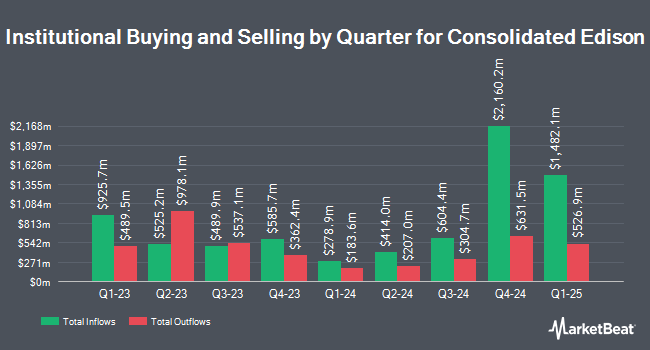SOA Wealth Advisors LLC. cut its stake in shares of Consolidated Edison, Inc. (NYSE:ED - Free Report) by 16.7% in the 1st quarter, according to the company in its most recent disclosure with the Securities and Exchange Commission (SEC). The firm owned 14,103 shares of the utilities provider's stock after selling 2,825 shares during the quarter. SOA Wealth Advisors LLC.'s holdings in Consolidated Edison were worth $1,560,000 as of its most recent SEC filing.
Several other hedge funds have also recently modified their holdings of ED. Jacobi Capital Management LLC raised its position in Consolidated Edison by 4.2% during the 4th quarter. Jacobi Capital Management LLC now owns 2,569 shares of the utilities provider's stock worth $229,000 after buying an additional 104 shares during the last quarter. Glen Eagle Advisors LLC raised its holdings in Consolidated Edison by 6.2% during the fourth quarter. Glen Eagle Advisors LLC now owns 1,902 shares of the utilities provider's stock worth $170,000 after purchasing an additional 111 shares in the last quarter. Richwood Investment Advisors LLC lifted its position in Consolidated Edison by 2.3% in the fourth quarter. Richwood Investment Advisors LLC now owns 5,194 shares of the utilities provider's stock valued at $463,000 after purchasing an additional 115 shares during the period. Penobscot Investment Management Company Inc. lifted its position in Consolidated Edison by 5.7% in the fourth quarter. Penobscot Investment Management Company Inc. now owns 2,300 shares of the utilities provider's stock valued at $205,000 after purchasing an additional 125 shares during the period. Finally, TrinityPoint Wealth LLC boosted its holdings in Consolidated Edison by 1.1% in the 4th quarter. TrinityPoint Wealth LLC now owns 11,395 shares of the utilities provider's stock valued at $1,017,000 after purchasing an additional 129 shares in the last quarter. 66.29% of the stock is owned by institutional investors and hedge funds.
Wall Street Analysts Forecast Growth
A number of research firms have commented on ED. Wells Fargo & Company raised their target price on Consolidated Edison from $103.00 to $114.00 and gave the company an "equal weight" rating in a report on Friday, May 2nd. KeyCorp cut shares of Consolidated Edison from a "sector weight" rating to an "underweight" rating and set a $90.00 target price for the company. in a report on Wednesday, May 14th. Scotiabank boosted their price target on Consolidated Edison from $100.00 to $101.00 and gave the stock a "sector perform" rating in a research note on Monday, February 24th. Guggenheim upped their price target on Consolidated Edison from $96.00 to $103.00 and gave the stock a "neutral" rating in a report on Friday, May 2nd. Finally, UBS Group lifted their price objective on Consolidated Edison from $110.00 to $113.00 and gave the stock a "neutral" rating in a report on Friday, March 21st. Three investment analysts have rated the stock with a sell rating, seven have issued a hold rating and two have given a buy rating to the company's stock. According to MarketBeat, the stock currently has an average rating of "Hold" and a consensus price target of $104.27.
Read Our Latest Stock Analysis on ED
Consolidated Edison Stock Up 0.1%
Shares of NYSE ED traded up $0.06 during mid-day trading on Wednesday, reaching $102.46. The company had a trading volume of 2,385,628 shares, compared to its average volume of 2,288,328. The stock has a fifty day moving average of $106.96 and a two-hundred day moving average of $100.45. The company has a debt-to-equity ratio of 1.07, a quick ratio of 0.93 and a current ratio of 1.01. Consolidated Edison, Inc. has a 12-month low of $87.28 and a 12-month high of $114.87. The company has a market capitalization of $36.92 billion, a price-to-earnings ratio of 19.55, a PEG ratio of 3.05 and a beta of 0.27.
Consolidated Edison (NYSE:ED - Get Free Report) last posted its quarterly earnings data on Thursday, May 1st. The utilities provider reported $2.25 EPS for the quarter, missing analysts' consensus estimates of $2.30 by ($0.05). Consolidated Edison had a return on equity of 8.62% and a net margin of 11.93%. The business had revenue of $4.80 billion during the quarter, compared to the consensus estimate of $4.21 billion. During the same quarter in the previous year, the firm posted $2.15 earnings per share. As a group, equities research analysts expect that Consolidated Edison, Inc. will post 5.62 EPS for the current year.
Consolidated Edison Announces Dividend
The company also recently declared a quarterly dividend, which will be paid on Monday, June 16th. Stockholders of record on Wednesday, May 14th will be paid a dividend of $0.85 per share. This represents a $3.40 annualized dividend and a dividend yield of 3.32%. The ex-dividend date of this dividend is Wednesday, May 14th. Consolidated Edison's dividend payout ratio (DPR) is presently 62.85%.
About Consolidated Edison
(
Free Report)
Consolidated Edison, Inc, through its subsidiaries, engages in the regulated electric, gas, and steam delivery businesses in the United States. It offers electric services to approximately 3.7 million customers in New York City and Westchester County; gas to approximately 1.1 million customers in Manhattan, the Bronx, parts of Queens, and Westchester County; and steam to approximately 1,530 customers in parts of Manhattan.
Read More

Before you consider Consolidated Edison, you'll want to hear this.
MarketBeat keeps track of Wall Street's top-rated and best performing research analysts and the stocks they recommend to their clients on a daily basis. MarketBeat has identified the five stocks that top analysts are quietly whispering to their clients to buy now before the broader market catches on... and Consolidated Edison wasn't on the list.
While Consolidated Edison currently has a Hold rating among analysts, top-rated analysts believe these five stocks are better buys.
View The Five Stocks Here
Discover the 10 Best High-Yield Dividend Stocks for 2025 and secure reliable income in uncertain markets. Download the report now to identify top dividend payers and avoid common yield traps.
Get This Free Report
Like this article? Share it with a colleague.
Link copied to clipboard.